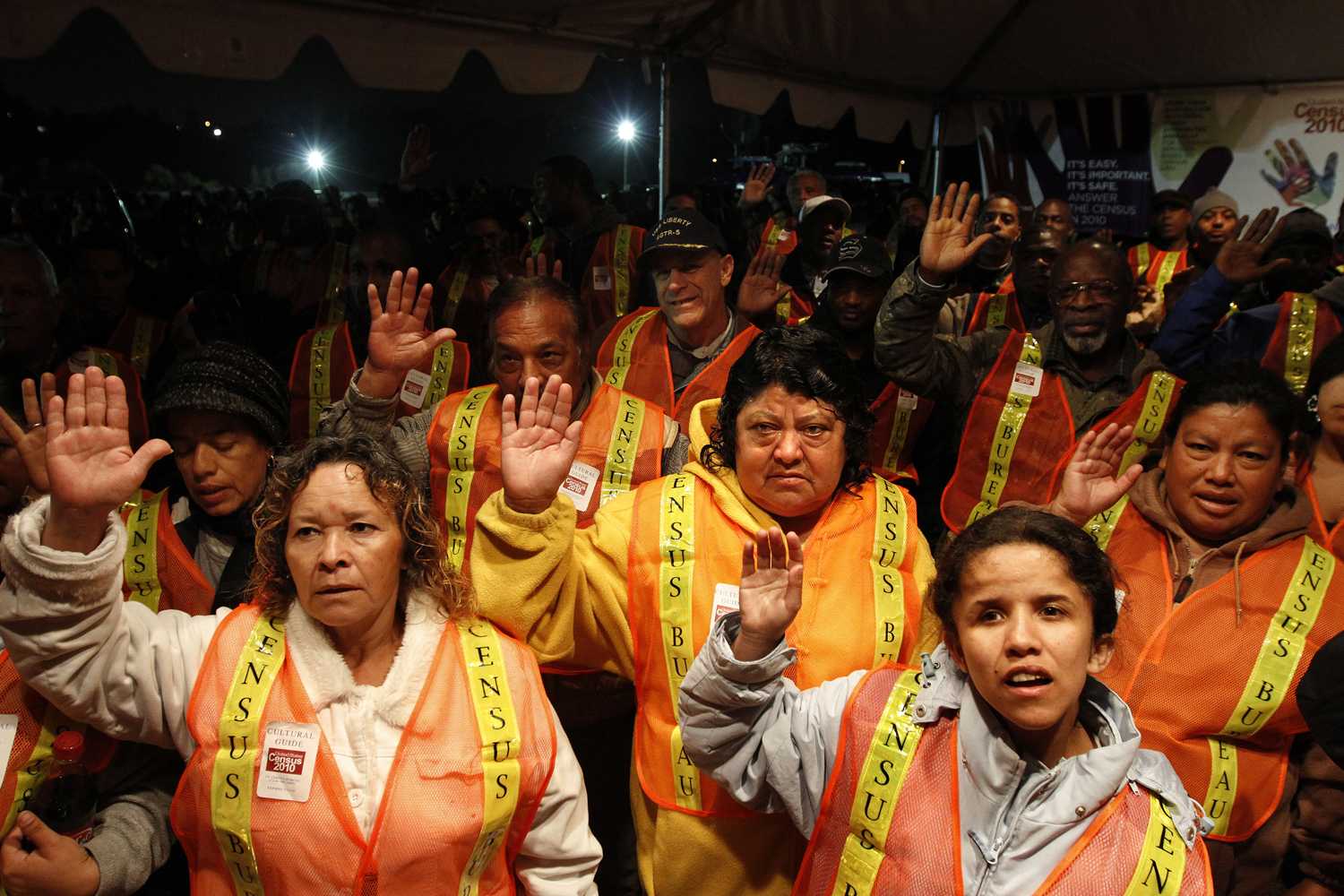Editorial: Citizenship question on 2020 census could cut PA funding


Census Bureau workers take an oath at Dodger Stadium in Los Angeles on March 30, 2010. Millions of foreign-born residents are expected to hide from or avoid the 2020 count because of the political climate created by U.S. President Donald Trump, census staff and civil rights groups say. (Liz O. Baylen/Los Angeles Times/TNS)
It’s no secret that for undocumented immigrants and other noncitizens, life can be rough under President Donald Trump’s administration. As of Monday, it just got significantly tougher.
The U.S. Department of Commerce announced a new component of the 2020 census Monday night, requiring that American residents disclose their citizenship status — a question that hasn’t been featured on census surveys since 1950.
Commerce Secretary Wilbur Ross said the new census addition is an attempt to “identify violations of the Voting Rights Act,” but this latest decision from the Trump administration is no more than a thinly veiled attempt to rear its head into state politics and meddle in allotments of federal funds and congressional seats.
At first glance, the citizenship question may seem to target those who are here illegally — which it surely does — but the ripple effect means it would reach much further. The census change would affect all citizens, especially in states with high immigrant populations like Pennsylvania and New Jersey.
These two states have joined ten others in threatening a lawsuit against the Trump administration on the basis that the citizenship status question would cause severe undercounts in population.
A census requirement will hardly entice people to tell the truth if they have something to hide, which could result in two possible courses of action — either they lie, or they avoid the census count altogether. Both would put Pennsylvania in a bad place.
If residents decline to fill out the census, state records for population will be inaccurate — even grossly inaccurate in an immigrant-heavy state like Pennsylvania. That would will severely undercut the amount of federal funding the state receives and uses toward projects like road repairs and building plans.
Erin Casey, the executive director of the group Pennsylvania Voice — which advocates for a fair 2020 census — underlines the possible consequences of a citizenship question.
“Pennsylvania communities could lose out on billions in federal aid,” she said.
If losing valuable tax dollars isn’t scary enough, an inaccurately low census count could result in losing congressional seats — which would exacerbate the battle Pennsylvania is already slowly losing. According to Election Data Services, Pennsylvania is predicted to fall from 18 to 17 congressional seats after the next census, continuing the trend of losing one seat every 10 years.
An accurate census is an important part of democracy — there’s a reason it’s at the top of the Constitution. Adding this last minute question will undoubtedly make the counting less accurate, and result in decreased representation for Democratic states — a win for Republicans, but a loss for democracy.
The administration can hide behind its well-intended claim to need “better data on the voting age population,” but Adanjesus Marin, the state director of Latino rights organization Make the Road Pennsylvania, isn’t buying it.
“It’s an attempt to affect who is in Congress,” Marin said of the citizenship question. “And try to suppress the amount of representation from states that are more progressive and have larger immigrant communities.”
Recent Posts
First Place | The summer apartment
See two girls: one 19, the other 20. They’re both engineering students far from home,…
Second Place | Moist and buttery gluten-free coffee cake
This gluten-free coffee cake is so indulgent you would never even know it was free…
Third Place | Dinner rush
Runner, please. Hands. Behind. 86 zucchini. Heard. There’s a slight ringing in my ears, and…
Runner-Up | Let me tell you about hobbies and death
Well, everyone has to have a hobby. Mom says you gotta love something or else…
Runner-Up | Artemis
In her dream, the moon exploded. Something hit it from behind — some dark shadow,…
Runner-Up | Setting the scene
My father and I are running through the forest. Our footsteps pound with silent desperation…

